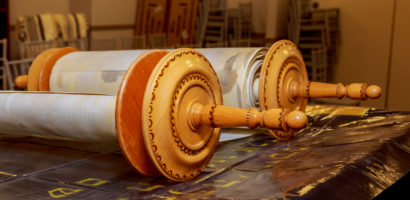 After this Jesus went about in Galilee. He would not go about in Judea, because the Jews were seeking to kill him.
After this Jesus went about in Galilee. He would not go about in Judea, because the Jews were seeking to kill him.
Once Jesus’ most dramatic statement about the nature of his person and mission (eating his body and drinking his blood) was delivered in Capernaum, he began to spend more time in Galilee. The reason is given in the text. He was avoiding Iudaia (Judea) because hoi Ioudaioi were trying to take his life. Remember that the Gospel of John, unlike the synoptics, portrays Jesus as Judean and not Galilean (Read about it here). Therefore, his itinerant preaching, his miracles and signs in Galilee are portrayed as being done nearby, but still in a somewhat foreign mission.
2 Now the Jews’ Feast of Booths was at hand.
The Feast of Tabernacles (or Booths, also known as Sukkot) is essentially a reenactment of the actions of the Israelites who lived in temporary dwellings (tents) for 40 years from the point of their exodus from Egypt to their entrance into Canaan. This account is meant to remind current generations of God’s sustaining power throughout the difficult and uncertain journey. Just as with the Passover, so also with the Feast of Tabernacles. The Israelites were instructed to reenact what happened to their forefathers so that they would remember and identify more fully with their roots.
Notice that Jesus’ conversations in Capernaum about God’s provision of eternal food for the redeemed were possibly a part of the preparation for the Feast of Tabernacles itself. It is highly likely that when Jesus spoke of God’s provision unto life eternal, the minds of Jesus and the believers in Galilean synagogues were fixed on the approaching feast
Once again, just as with the Passover of the Jews (hoi Ioudaioi), here we are told that this was the Feast of Tabernacles of the hoi Ioudaioi. The reason for this was not that the readers needed to know that Passover and the Feast of Tabernacles were Jewish holydays, but that there were several different calendars in use. In John, Jesus followed the calendar that was set by the leadership of Jerusalem temple, therefore he always celebrated the holidays of the hoi Ioudaioi.
3 So his brothers said to him, “Leave here and go to Judea, that your disciples also may see the works you are doing. 4 For no one works in secret if he seeks to be known openly. If you do these things, show yourself to the world.”
Jesus’ brothers, who did not yet believe that their oldest sibling was anything special, said to Jesus: “Sukkot is coming. You are one of the hoi Ioudaioi! (Note that they referred to the hoi Ioudaioi as Jesus’ disciples in vs. 3). You must show your signs not only in Galilee, but also in Judea. If you want to be accepted by your own, you must also do them in Jerusalem!”
It is in this light that we should understand the earlier words of John in connection with the hoi Ioudaioi that “his own people did not receive him” in John 1.11 (Read “He came unto His own”).
5 For not even his brothers believed in him. 6 Jesus said to them, “My time has not yet come, but your time is always here.
The phrase “my time has not yet come” was first mentioned in John 2 (at the wedding in Cana) and will be repeated as the story continues to unfold. We will remark on this important phrase later, but for now, suffice it to say that the phrase is mainly used when others (for now only family members) call upon Jesus to perform miracles. Jesus’ criticism of his brothers was simple – they were religious, but they were also misguided.
Sukkot was one of the three feasts during which every Jewish male was obligated to come to Jerusalem for formal worship (this would be true especially for those who lived relatively close to Jerusalem like Jesus). By implying that he would not go up to Jerusalem, he declined his brothers’ invitation. The brothers were not surprised by this since rumors about Jesus’ life being endangered were no doubt discussed not only on the streets, but also in the family circle.
Remember, none of his brothers had yet believed. Sometime later, however, one of Jesus’ brothers would become known as James the Just (Yakov haZaddik). In the decades after Jesus’ death and resurrection, he would head the Jesus’ movement headquartered in Jerusalem and would be considered by many to be the first rightful patriarch of Jerusalem.
7 The world cannot hate you, but it hates me because I testify about it that its works are evil. 8 You go up to the feast. I am not going up to this feast, for my time has not yet fully come.”
In the Gospel of John, the world means different things. In this case it does not refer to all people of the world in their fallen state, but to those who opposed Jesus – in other words, the Jerusalemite establishment. All the evil kings of Israel (authorities) hated the prophets for not withholding their criticism. One of the reasons King David is portrayed in a positive light is because when he was confronted about his sin by the prophet Nathan, David responded with repentance and faith. King David, who was far from perfect, did not seek to kill the prophet of God. Those formally in charge of Israel in the time of Jesus, did seek to kill their prophets. They would succeed, but their goal to silence God’s word against them would not succeed.
9 After saying this, he remained in Galilee. 10 But after his brothers had gone up to the feast, then he also went up, not publicly but in private.
As soon as his brothers departed for Jerusalem, Jesus also left and traveled to Jerusalem incognito – something his brothers had not expected.
11 The Jews were looking for him at the feast, and saying, “Where is he?” 12 And there was much muttering about him among the people. While some said, “He is a good man,” others said, “No, he is leading the people astray.” 13 Yet for fear of the Jews no one spoke openly of him.
Notice how hoi Ioudaioi (translated normally as “the Jews”) are clearly portrayed as not simply Judeans, but as the members of Judean authorities. They were looking for him (vs.11). The phrase, “among the people,” is how the Gospel of John refers both to the people who came to Jerusalem for the Feast of Tabernacles and to ordinary citizens of Judea. These people were engaged in an ongoing, but secret, conversation about Jesus.
What clearly identifies hoi Ioudaioi as the Judean authorities (though not exclusively) is that not only positive, but also negative conversation about Jesus was carried out in secret by the people who had gathered from near and distant places. Jesus was a taboo subject. Everyone knew it; those who supported him and those who opposed him. The Judean authorities were watching. The walls had ears.
To receive more information about learning Biblical Languages with Hebrew University of Jerusalem/eTeacher Biblical program online at affordable cost, please, click here.
© By Eli Lizorkin-Eyzenberg, Ph.D.
To sign up for weekly posts by Dr. Eli, please, click here. It is recommend by Dr. Eli that you read everything from the beginning in his study of John. You can do so by clicking here – “Samaritan-Jewish Commentary”.






This is very good thanks 🙂
according to a sun-moon calendar currently believed to be observed during those days by some israelites, we are about to celebrate Sukkot the night of september 4,2013. Thank you .
What am I saying, Sukkot? I meant Iom Teruah. Pardon me.
Your article has caused me to rethink my taking of communion. My “roots” didn’t start with Jesus dying on the cross like it is commonly reenacted today. I mentally go back to my pre-Jesus/pre-gospel years. I now see these “pre” years much like the Feast of Tabernacles (“God’s sustaining power in a difficult and uncertain journey” out of slavery.) Which mental reenactment is correct? All of the reasons why I needed Jesus, my turning to God, and my hungering and thirsting for righteousness sound pre-Jesus to me.
Very stimulating, thank you or the fresh perspective on these verses. I have a comment for your consideration. I see the connection you are making with hoi iudaoi and “his own that did not receive him” Curiously, “ta idia” – “that to which” he came is neuter plural, which is odd a little, because successive “oi idoi” those who did not receive him are in masculine plural. A number of those who read John 1 through the lens of Jewish exegesis have noted how it can be seen as a midrash on Gen 1, with logos being in the beginning and creating all things. The scope of the pericope into which this comment “of not receiving” would than fall is “creation”. Coincidentally “panta” as in “all things that came to be” through logos in verse 3 is also in neuter plural. In my opinion neuter “panta” explains the neuter plural “ta idia” and may mean the same thing, creation. Jesus as the word created “all things” and came to “these things” but they i. e. created things (collective use of masculine plural) did not receive him. Again a beautiful midrashic correlation…
Yes, Peter, this is my own view as well. I think that in Greek there is no way around that.eli